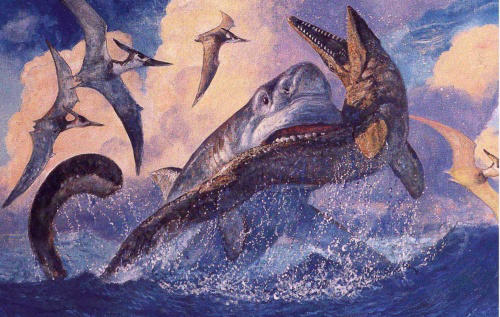Megalodon was an ancient shark that may have been 40 feet (12 m) long or even more. (There are a few scientists who estimate that it could have been up to 50 or 100 feet (15.5 or 31 m) long!), who lived from roughly 25 to 1.6 million years ago, during the Miocene and Pliocene epochs. It is now extinct, but the exact time of its extinction is hotly debated. Not only was Megalodon the biggest prehistoric shark that ever lived; it was the biggest predatory marine creature in the history of the planet, outweighing both modern Great White Sharks and Liopleurodon or Kronosaurus.
 Shark fossils are extremely rare because sharks have no bones, only cartilage, which does not fossilize well. Their teeth, however, are very hard, and made of a bone-like material coated with hard enamel and they fossilize very well. Megalodon teeth are similar to those of the Great White Shark, but are much bigger, thicker, and with finer serrrations. Megalodon's jaws could open 6 feet (1.8 m) wide and 7 feet (2.1 m) high. The jaws were loosely attached by ligaments and muscles to the skull, opening extremely wide in order to swallow enormous objects. It could easily swallow a large Great White Shark whole!
Shark fossils are extremely rare because sharks have no bones, only cartilage, which does not fossilize well. Their teeth, however, are very hard, and made of a bone-like material coated with hard enamel and they fossilize very well. Megalodon teeth are similar to those of the Great White Shark, but are much bigger, thicker, and with finer serrrations. Megalodon's jaws could open 6 feet (1.8 m) wide and 7 feet (2.1 m) high. The jaws were loosely attached by ligaments and muscles to the skull, opening extremely wide in order to swallow enormous objects. It could easily swallow a large Great White Shark whole!
 Shark fossils are extremely rare because sharks have no bones, only cartilage, which does not fossilize well. Their teeth, however, are very hard, and made of a bone-like material coated with hard enamel and they fossilize very well. Megalodon teeth are similar to those of the Great White Shark, but are much bigger, thicker, and with finer serrrations. Megalodon's jaws could open 6 feet (1.8 m) wide and 7 feet (2.1 m) high. The jaws were loosely attached by ligaments and muscles to the skull, opening extremely wide in order to swallow enormous objects. It could easily swallow a large Great White Shark whole!
Shark fossils are extremely rare because sharks have no bones, only cartilage, which does not fossilize well. Their teeth, however, are very hard, and made of a bone-like material coated with hard enamel and they fossilize very well. Megalodon teeth are similar to those of the Great White Shark, but are much bigger, thicker, and with finer serrrations. Megalodon's jaws could open 6 feet (1.8 m) wide and 7 feet (2.1 m) high. The jaws were loosely attached by ligaments and muscles to the skull, opening extremely wide in order to swallow enormous objects. It could easily swallow a large Great White Shark whole!  Like most sharks, Megalodon's teeth were probably located in rows which rotated into use as they were needed. Most sharks have about 3-5 rows of teeth at any time. The front set does most of the work. The first two rows are used for obtaining prey, the other rows rotate into place as they are needed. As teeth are lost, broken, or worn down, they are replaced by new teeth. Megalodon may have had hundreds of teeth at one time. It did not chew their food like we do, but gulped it down whole in very large chunks.
Like most sharks, Megalodon's teeth were probably located in rows which rotated into use as they were needed. Most sharks have about 3-5 rows of teeth at any time. The front set does most of the work. The first two rows are used for obtaining prey, the other rows rotate into place as they are needed. As teeth are lost, broken, or worn down, they are replaced by new teeth. Megalodon may have had hundreds of teeth at one time. It did not chew their food like we do, but gulped it down whole in very large chunks.Unlike some marine predators of prehistoric times--which were restricted to the coastlines or inland rivers and lakes of certain continents--Megalodon had a truly global distribution, terrorizing whales in warm-water oceans all over the world. Apparently, the only thing keeping adult Megalodons from venturing too far toward solid land was their enormous size, which would have beached them as helplessly as 16th-century Spanish galleons.
So Megalodon was huge, relentless, and the apex predator of the Pliocene and Miocene epochs. What went wrong? Well, there's no lack of theories: Megalodon may have been doomed by global cooling (which culminated in the last Ice Age), or by the gradual disappearance of the giant whales that constituted the bulk of its diet. (By the way, some people think Megalodons still lurk in the ocean's depths, but there's absolutely no evidence to support this.)









3 comments:
bestial!!!
friggin yuge
Can we conclusively say that Megalodon is extinct since 95% of the ocean has not been explored?
Post a Comment